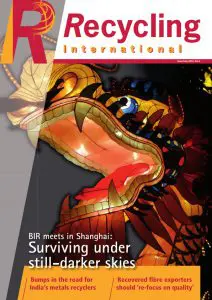Page 26 from: June / July 2013

26 June/July 2013
‘Unbelievable.’ That was the response of re-elected BIR Tex-
tiles Division president Olaf Rintsch of
Germany-based Textil Recycling K&A
Wenkhaus to the news that used tex-
tiles are now the plunder of choice for
some criminal gangs.
Alan Wheeler of the UK’s Textile Recy-
cling Association, the BIR Textiles Divi-
sion’s new general delegate, had just
informed the meeting that the used
clothing sector in his country ‘is still
being routinely targeted by criminal
gangs’. Wheeler described the police
response as ‘variable’, noting a recent
case in which a gang was caught in the
act of trying to steal clothing collected
by a school and was found to have
stolen goods worth several thousand
dollars in its van. ‘The attending offi –
cers did not appreciate the value of the
items or the serious nature of the crime
and simply let the offenders go without
even issuing a police caution,’ he said.
‘It was a very frustrating affair.’
According to the Textiles Division’s vice
president Mehdi Zerroug of Framimex
in France, used clothing theft is carried
out on a varying scale throughout
Europe. In his own country, the used
textiles sector has been hit by thefts of,
and from, containers – and even by
thefts perpetrated during the collection
process itself.
The very survival of collections in
France is under threat and yet the
authorities appear to be ‘not terribly
interested’ in taking action because the
sector’s goods are deemed to be
among the ‘less valuable’, he contend-
ed. Zerroug identifi ed benchmarking of
enforcement actions from country to
country as a possible way forward.
Surge of bankruptcies
The theme of survival was also taken
up by Rintsch and Wheeler, the latter
revealing to delegates that more than
10% of his association’s membership
has ceased trading in the last year or
so, reportedly because
some textiles collectors
‘could not afford to con-
tinue paying the prevail-
ing market prices’ for
originals. And he added:
‘I suspect that there are
more to come.’ This
surge in bankruptcies led
to a small market over-
supply and lower values
early in 2013, but prices have since
remained ‘relatively stable’.
For his part, Rintsch warned how diffi –
cult market conditions and unfair com-
petition have been damaging the tra-
ditional used textiles industry. Prices of
originals have reached ‘a zenith’ and
sorters are fi nding it ‘almost impossible’
to make profi ts. He continued: ‘We have
been here through the good and the
bad days, so we ought to be given the
space to survive rather than allow the
destruction of a branch that has been
around for 200 years.’ If the industry’s
survival continues to be threatened by
its inability to obtain originals at rea-
sonable prices, then a ‘huge’ number of
jobs will be lost and ‘taxpayers will have
to pay’. He concluded: ‘The conditions
should be the same for us all.’
Margins under pressure
In Europe, the shoes market has been
weakening, wiper prices ‘need to go
up’ and ‘we are far from covering our
costs’ on the recycling grades, Rintsch
observed.
And market conditions have also been
challenging beyond Europe, according
to the round-up provided by the Tex-
tiles Division’s honorary president
Klaus Löwer of Hans Löwer Recycling
in Germany. Although the ‘overheat-
ed’ demand for unsorted textiles has
abated in North America, margins
remain generally under ‘major pres-
sure’, with more business closures
likely. And in Japan, prices for col-
lected textiles have increased by
100% while volumes have declined
by 20%.
Growing volumes
A perspective on the market in China
was provided by guest speaker Lin Shi-
dong, secretary general of the China
Chain Store and Franchise Association
(CCFA) Recycled Fibre Commission.
Growing volumes of used clothes are
being discarded in line with the gen-
eral improvement in living standards
but education and strong policy leader-
ship are required to achieve a potential
reuse level of close to 60%. There is
also a need to upgrade technologies to
boost recycling, he added.
The speaker confirmed that China
exports some sorted used clothing,
notably to Africa, but that the majority
of the collected material is reused
domestically.
Löwer welcomed this insight into tex-
tiles recycling in China as well as the
potential for closer collaboration
between the country and BIR.
Alan Wheeler called on the police
to recognise ‘the seriousness of
textile theft’.
As of late, prices of originals have
reached ‘a zenith’, Olaf Rintsch
declared.
B I R S H A N G H A I
In the recycling fraternity, the non-ferrous scrap indus-
try is not alone in suffering thefts of its feed material,
namely high-value metals. The used clothing placed in
collection containers has also become a magnet for
thieves – and even for organised crime, it was reported
in Shanghai.
Give us ‘the space
to survive’,
Rintsch pleads
‘The conditions
should be the
same for us all.’
Textiles
RI-5_BIR Textiles.indd 26 18-06-13 15:23



